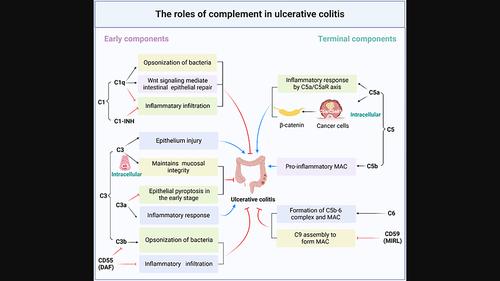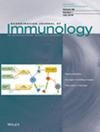补体与溃疡性结肠炎的关系
IF 4.1
4区 医学
Q2 IMMUNOLOGY
引用次数: 0
摘要
溃疡性结肠炎(UC)是一种炎症性肠病(IBD),其特征是结肠慢性炎症复发,导致持续的粘膜炎症。UC的全球发病率正在稳步上升。UC的发病机制涉及免疫机制,其中补体通过诱导局部慢性炎症反应促进组织损伤发挥关键作用。然而,各种补体成分在UC发展中的作用是复杂的,甚至是矛盾的。一些成分(如C1q、CD46、CD55、CD59、C6)具有保护肠道屏障、减轻肠道炎症的作用,而另一些成分(如C3、C5、C5a)可加重肠道损伤,加速UC的发展。补体系统最初被认为主要以细胞外模式起作用;然而,最近的证据表明,它也可以作为细胞内的复合物。本研究综述了目前关于补体及其在UC发展中的作用的研究。虽然很少有研究描述细胞内补体如何促进UC,但我们根据相关出版物讨论了潜在的未来方向。我们还强调了靶向补体治疗IBD的新方法。本文章由计算机程序翻译,如有差异,请以英文原文为准。

Revisiting the relationship between complement and ulcerative colitis
Abstract Ulcerative colitis (UC) is an inflammatory bowel disorder (IBD) characterized by relapsing chronic inflammation of the colon that causes continuous mucosal inflammation. The global incidence of UC is steadily increasing. Immune mechanisms are involved in the pathogenesis of UC, of which complement is shown to play a critical role by inducing local chronic inflammatory responses that promote tissue damage. However, the function of various complement components in the development of UC is complex and even paradoxical. Some components (e.g. C1q, CD46, CD55, CD59, and C6) are shown to safeguard the intestinal barrier and reduce intestinal inflammation, while others (e.g. C3, C5, C5a) can exacerbate intestinal damage and accelerate the development of UC. The complement system was originally thought to function primarily in an extracellular mode; however, recent evidence indicates that it can also act intracellularly as the complosome. The current study provides an overview of current studies on complement and its role in the development of UC. While there are few studies that describe how intracellular complement contributes to UC, we discuss potential future directions based on related publications. We also highlight novel methods that target complement for IBD treatment.
求助全文
通过发布文献求助,成功后即可免费获取论文全文。
去求助
来源期刊
CiteScore
7.70
自引率
5.40%
发文量
109
审稿时长
1 months
期刊介绍:
This peer-reviewed international journal publishes original articles and reviews on all aspects of basic, translational and clinical immunology. The journal aims to provide high quality service to authors, and high quality articles for readers.
The journal accepts for publication material from investigators all over the world, which makes a significant contribution to basic, translational and clinical immunology.

 求助内容:
求助内容: 应助结果提醒方式:
应助结果提醒方式:


